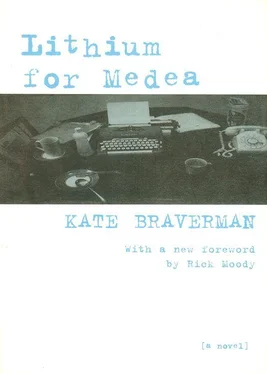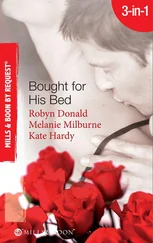We walked back into my father’s room. There was the smell of something terrible, dark and rotten, rancid plant fibers. The smell was thick and black, overpowering. The smell was coming from my father’s flesh. It was the smell of decay, of death.
WHAT TIME. My father inched himself into something like a sitting position. He pointed to his wrist. I could see the white line where he had worn his watch. He held up six fingers.
Did he think it was six o’clock? He must mean six at night. Time to turn on the news. Time for a shot of bourbon and a cigar. Time for day to shut down all around him while he watered the ivy, pruned the peach and apricot trees, the avocado tree, the lemon tree. Time to water the drained brownish backyard grass. Time to pick up a form sheet for the next day. Time for the Dodgers or Lakers on television while waiting for the next ambush, waiting, waiting for the cancer to return, a black swarm.
“It’s noon.” It was the first thing I had said to my father. He had been staring at Francine. Now he looked at me, squinting, trying to focus on me, recognize me.
WHATS THIS. He pointed to the oxygen tube.
“It’s temporary. Oxygen,” Francine told him. “It’s only temporary.”
How did she know that? I stared at her. She was biting her lip.
My father pulled on the transparent green tube running from the metal tank to his throat. With the blinds drawn, there was no time in the room, no seasons, no standard divisions. Everything was one long unbroken morphine afternoon, a dream without motion or direction.
“Sit down near him,” Francine directed.
I sat down lightly on the edge of my father’s bed. I reached for his hand and ran my fingertips gently across the skin, around the IV needle. The smell was like poisonous fumes. It filled my mouth and lungs. I could taste it on my tongue.
“Does it hurt?” I asked, softly. “Do you want a shot?”
“You can have morphine whenever you want it,” Francine told my father. “I read your chart.”
My father seemed to nod his head. Then he closed his eyes. His breath was soft, slow, a mere rustle. We watched him doze.
“It’s worse than before,” Francine assured me. We were walking toward the elevator. She was very pale. “You better prepare yourself. I don’t think he’s going to make it.”
I stopped walking. I stared at her, hard. “We don’t know that. It’s still fifty-fifty.”
Francine said nothing. We got into the elevator. We walked past the emergency room and into the hospital parking lot.
“Now you know,” Francine said. “I was twenty-seven. Precisely the age you are now. Only I was all alone. With a husband dying and a child to support.”
Slowly a haze parted. I glimpsed the world as it must have appeared to Francine. She had been stripped naked. The vultures had picked her clean.
“They sent him to California to die,” my mother said. “They said he wouldn’t last the winter in the East. Can you imagine what it was like for me? Holding him in my arms at night. Not knowing if he would just die at my side.” Francine lit a cigarette. “You’ve always hated me, blamed me. I was in a strange city. Alone, no friends, no family, a child, broke, an invalid husband in bed.”
I glimpsed Francine standing on the strange bleached Southern California plain with her back to the sea and the cruel sun going berserk, turning to blood above her head, above the flat white meaningless streets, above the stunted anemic palm fronds slatted and thick, the landscape itself strange and unreasonable. Now I was standing there with the sea opening its spiked gray mouth and the black vultures circling hungry just above me.
The wheel had spun. Twenty years passed. Now it was my turn. The first time I had been six years old. I remembered the world as black and white, before and after. One day it was precisely as it had always been. My mother had iron pots for hands. Soup was steaming. Snow fell but I was never cold. The old gray stone house was the perfect shell. There were no violations. My father left each morning in his special work clothes with the painting stains on the pant legs. My father carried his big brown toolbox. He was going to build another house. My mother was making things steam in the kitchen. She was humming. She met me at the curb where the school bus stopped. She was smiling.
When my mother baked, I baked, too. I had special tiny pie tins. My father would study the big pie and the little pie and eat mine. When my mother ironed, I ironed, too. I had a special miniature ironing board. My mother gave me the napkins to iron while she ironed my father’s shirts. The seasons spilled around us gently. We were undamaged. We were waiting on the gray stone porch for Daddy to come home from work. My mother had taken a bath and put on lipstick. The pies were cooling. Soon we would see Daddy’s car.
Overnight the world was torn apart, torn inside out, irrevocably stained. The stain spread out and became a dark spot I wore embedded in the center of my head.
“Do you understand?” Francine asked. Her face was very close. Her eyes seemed like beacons, iridescent and haunted, enormous yellow globes.
Did I have the power of absolution? Was I being asked for a blessing, a dispensation?
“You did well, Mother,” I said.
We embraced awkwardly. Her body felt very warm, too warm, almost feverish. I walked quickly to my car.
It was late afternoon. I stood on the porch of the Woman’s House. I could hear the slow drugged humming of insects sliding from one red plateau of geraniums to another, red patches scattered across the city like landing strips. There was a sense of frenzied insects leaping.
I sat down on the side of the canal. Yellow wildflowers rose in thick rows across the vacant field near my house. I sat very still, a part of the landscape, like a rock. In time, the edges of the canals would grind down and the vacant field reach out and push over me. Wild black grapes would grow in my arms. Vines would wrap around my ankles and dirt lick my thighs. In time, I would become a mound on a hill, a place for insects to rest their too thin veined wings.
And where were the fine crisp white words saying the man is dead. The man no longer breathes. The man lay in his small white bed. Life ebbed from him as he slept.
I picked up my mail. One letter, handwritten. I read the letter slowly. The paper was very white and thin in my hands. Near me, the ducks grew quiet, preparing to squawk their twilight pastel prayers of gratitude while the water beneath them browned. I read the letter again. It was from my cousin Rachel. She was in a Maine mental hospital. We had never met.
Suddenly it seemed to make perfect sense that she contact me. It was another proof that the wheel was indeed spinning. The evidence was piling up. It was my turn.
March 3
Dear Rachel,
You ask, did Medea take lithium?
The implications are legion. I know nothing about lithium.
You say you jumped off a bridge? You say the ground called to you, wanted you, arched its spine to you hungry? You ask if I think you are crazy.
I don’t know what crazy is any more. I know our family harbors a manic-depressive streak. It runs like a stain through this family. There isn’t even an undercurrent of stigma attached to it. After all, the kings of Europe were hemophiliacs. Is it so remarkable that their shopkeepers, moneychangers, outcast bankers and rag traders should also have a small dark anomaly? In our case, a certain inability to securely anchor a sense of proportion, a perspective lasting more than twenty minutes. Let me try to explain, although I must caution you, I no longer believe in explanations.
I do not think it “odd” that you would turn to me in your crisis, turn to me as the world you know tumbles and day itself collapses. You have heard stories about me? Your mother suggested this? Perhaps you both think because I am ten years older than you I have learned something of value. You’ll have to judge that for yourself.
Читать дальше












